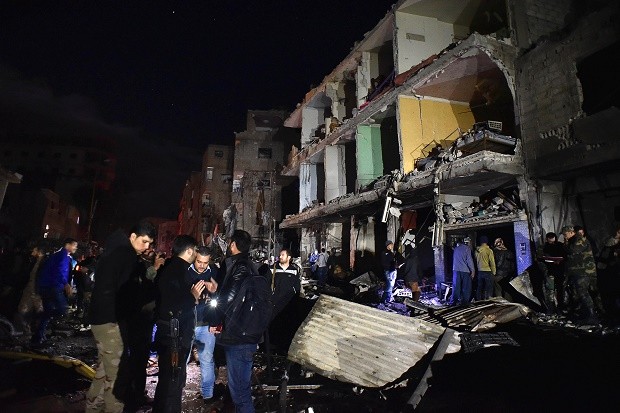ISIS bombs kill more than 140 as US, Russia press Syria truce

People gather in the aftermath of a multiple explosive attack in the Sayyida Zeinab area, 10 km south of Damascus, Syria, Sunday, Feb. 21, 2016. The ISIS group claimed responsibility for a triple blast in the Shiite suburb, saying two ISIS fighters set off a car bomb before detonating their explosive belts and killing dozens. Residents said the attack was about a kilometer (0.6 mile) from one of Shiite Islam’s holiest shrines and did not damage it. AP
SAYYIDA ZEINAB, Syria — A string of suicide bombings near a Shiite shrine outside Syria’s capital and in Homs claimed by jihadists killed at least 142 people Sunday, as Washington and Moscow worked to secure a ceasefire.
The Islamic State of Iraq and Syria (ISIS) group said it was behind the carnage.
US Secretary of State John Kerry said a provisional deal had been reached on the terms of a truce in Syria’s brutal five-year conflict, only for the bloodshed to intensify on the ground.
READ: ISIS officially recognizes oath of allegiance from PH militant groups | BIFF, Abus pledge allegiance to Isis
Near Damascus, a car bombing followed by two consecutive suicide attacks ripped through the area of the Shiite shrine of Sayyida Zeinab and killed 83 people, Syria’s official news agency SANA reported.
SANA, quoting a police source, said 178 people, including children, were among the wounded. State television said the attacks came as pupils were leaving school in the area.
The Syrian Observatory for Human Rights gave a lower toll of 68 dead but said many wounded were in critical condition.
An AFP reporter said the blasts struck about 400 meters (yards) from the revered Shiite shrine containing the grave of a granddaughter of the Prophet Mohammed.
At least 60 shops were damaged and cars reduced to mangled metal. A January attack in the same area — also claimed by ISIS — killed 70 people.
The Observatory also reported that two car bombs killed at least 59 people and wounded dozens in the pro-regime district of Al-Zahraa in the central city of Homs.
ISIS said online that two suicide bombers struck in Sayyida Zeinab and two others drove explosive-packed cars into crowds in Homs.
State television footage from Homs showed emergency workers carrying a charred body on a stretcher past devastated shops and mangled cars and minibuses.
Al-Zahraa — whose residents are mostly from the same Alawite sect of Shia Islam as Syria’s ruling clan — has been regularly targeted.
‘Provisional’ ceasefire deal
World powers, which have been pushing for a halt in Syria’s nearly five-year war, had hoped to see a truce take effect on Friday but have struggled to agree on the terms.
On Sunday, Kerry spoke with Russian Foreign Minister Sergei Lavrov at least three times to try to nail down a truce.
“We have reached a provisional agreement, in principle, on the terms of the cessation of hostilities that could begin in the coming days,” Kerry said in Amman after one round of talks.
The Russian foreign ministry later said Lavrov and Kerry held two more telephone conversations and finalised the ceasefire terms to be submitted to their respective presidents.
World powers proposed the truce just over a week ago as part of a plan that also included expanded humanitarian access, in a bid to pave the way for peace talks to resume.
The talks, which collapsed earlier this month in Geneva, had been scheduled to resume on February 25, but the UN’s Syria envoy has already acknowledged that that date is no longer realistic.
Key opposition umbrella group the High Negotiations Committee said at the weekend it would agree a temporary truce only if regime backers halted fire.
HNC chief Riad Hijab said any ceasefire must be reached “with international mediation and with guarantees obliging Russia, Iran and their sectarian militias and mercenaries to stop fighting”.
Syrian President Bashar al-Assad, meanwhile, told Spain’s El Pais newspaper he was “ready” for a ceasefire, but that it should not be exploited by “terrorists”.
Turkey defends shelling Kurds
Moscow is a key architect of the proposed ceasefire, but has shown little sign so far that it plans to rein in the air campaign it began in September in support of Assad’s government.
On Saturday, the Kremlin said it would continue “to provide assistance and help to the armed forces of Syria in their offensive actions against terrorists”.
Regime forces backed by Russian strikes were advancing on Sunday east of Aleppo city against ISIS, consolidating their control over a stretch of highway from the city to the Kweyris military base.
The Observatory said at least 50 ISIS fighters had been killed in clashes and Russian strikes since Saturday morning.
Tensions have been rising between Moscow and opposition-backer Ankara, alarmed by both the regime’s Russian-backed advances and a major operation by Kurdish-led forces in Aleppo province.
The Kurdish People’s Protection Units (YPG) and their Arab partners have seized key territory from rebel forces in Aleppo province, prompting Turkey to shell their positions.
Ankara considers the YPG to be an affiliate of the outlawed Kurdistan Workers’ Party, which has waged a decades-long insurgency against Turkey.
It fears the Kurdish advances are intended to link areas in north and northeast Syria to create a contiguous semi-autonomous Kurdish zone along the Syrian-Turkish border.
On Sunday, Turkish President Recep Tayyip Erdogan defended his country’s fight against the YPG as “legitimate defence” after international calls for Ankara to halt its military action in Syria.